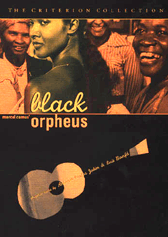
Black Orpheus
Original Title: Orfeu Negro
Directed by: Marcel Camus, Brazil/France/Italy, 1959
Drama, 100 min.
Distributed by: Criterion Collection
Story:
Classic myth of Orpheus and Eurydice retold during the Carnival in Rio. Eurydice [Marpessa Dawn] comes to Rio to visit her cousin Sarafina [Léa Garica] during the week of the Carnival preparations. Buss conductor Orpheo [Breno Mello] who is engaged Mira [Lourdes de Oliveria] falls head over heels in love with her and will stop at nothing to seduce her. But when a mysterious figure disguised as death who has been stalking and killing women in the capital targets Eurydice the race is on. Will Orpheo manage to rescue Eurydice before it’s too late?
Me: Often quoted as one of the greatest movies ever and I have to agree. It is an amazing piece of cinema. The look of the film is fantastic, and Criterion has really done a great job of restoring this gem. Jean Bourgoin’s cinematography is awesome; he captures all the colours and senses of the carnival, from the opening aerial shot of Rio and the crowded colourful big sets to the tight claustrophobic shots of the empty murky hospital as Orpheo searches for Eurydice. Great stuff. As most great movies have their roots in the oldest stories ever told it’s no wonder that Camus delivers a fantastic movie. Almost everyone knows the tale of Orpheus and Eurydice and their journeys in the underground, the deal with death and the promises not to look back when Eurydice is allowed to go, it brings a natural and deeply rooted suspense to the film. Even though I know the myth and know how it is supposed to end I was really into this movie and it never let’s you down, you keep on rooting for their love even to the last frame. The choice of setting it in the carnival of Rio is a great choice as this allows Camus to use the energetic samba beats, vibrant music and amazing costumes. The actors make a real impression; Mello, Dawn and de Oliveria are attractive people and bring their characters to life in a believable way. The humoristic tone that he interweaves with the younger generation obviously ready to take over and keep the wheels spinning is brilliant. A complete and probably perfect cinematic experience, it comes as no surprise that this movie won the Palme d’Or in Cannes in 1959 and an Academy award for best foreign film in 1960.
Image: 1.33:1 Widescreen, removable English subtitles
Audio:
Even though it is remixed the soundtrack is still Portuguese Dolby Digital Mono
Extras:
Being a Criterion disc I had expected more, but if you take into the calculation that this is a four minute longer uncut restored print, with a re-mastered soundtrack bringing Antonio Carlos Jobim and Luis Bonfá’s energetic bossa nova score to new levels then that might do. There’s also a French trailer for the film.






No comments:
Post a Comment